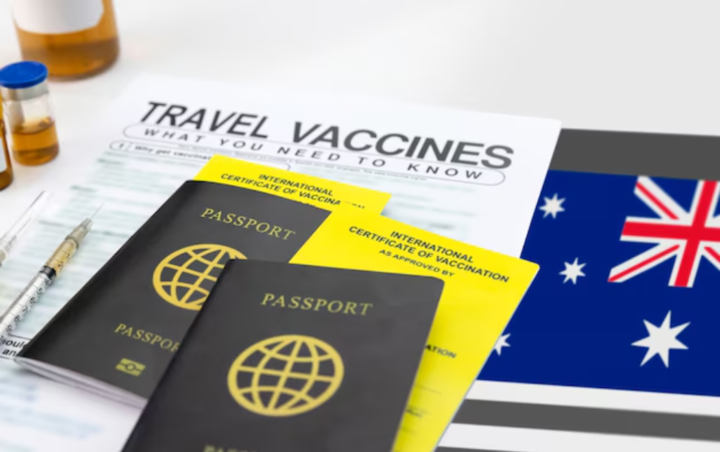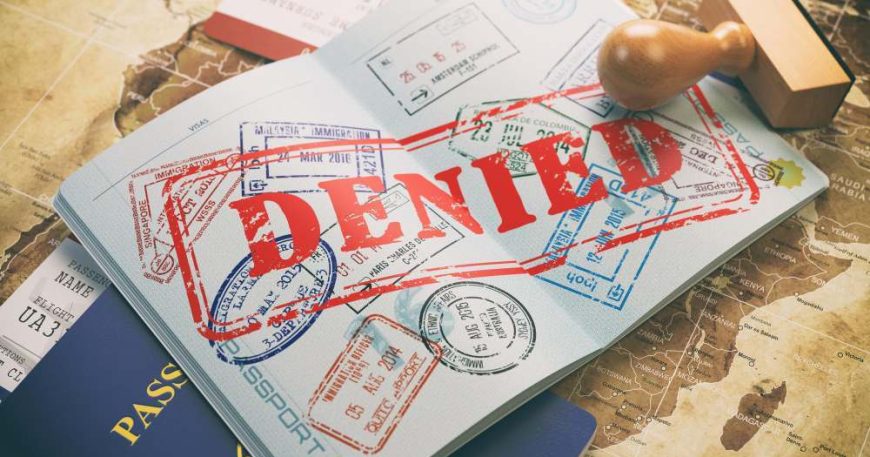Applying for an Australian visa opens the door to a thrilling world of travel, work, study, or migration. However, the application process is complicated, and refusals are more common than you think. The Australian Department of Home Affairs carefully reviews each application, and even minor mistakes can result in Australian visa rejection reasons.
With visa policies continually changing, understanding Australian visa rejection reasons is important. Many issues, such as missing documentation to financial irregularities, can affect your chances of approval. We will discuss all the mistakes that candidates generally make and share some practical tips that can help you through the process easily. By avoiding these mistakes, you may submit a good, error-free application and increase your chances of getting an Australian visa.
Tops Reason for Australia Visa Rejection
The process of applying for an Australian visa can be complex and time-consuming, although some categories of visas are quite straightforward to apply for, rejection still happens. When applying for a visitor, student, work, or migration visa, it is important to know the common mistakes that lead to rejection. A small mistake or missing information can result in Australian visa rejection reasons. Recognizing these common errors allows you to reinforce your application and enhance your chances of visa approval. The most common causes for visa rejection are:
Incomplete or Incorrect Documents
Incomplete or incorrect documentation is one of the most common Australian visa rejection reasons. The Department of Home Affairs requires complete, up-to-date, and consistent documents; missing details or errors may result in delays or rejection.
Common issues include missing passport pages, expired passports, outdated financial records, and inconsistent reference letters. Make sure that all documents are current and relevant. Keeping photocopies for reference and seeking professional guidance can increase your chances of approval.
Health and Character Issues
Health and character are important factors in Australia’s visa application process. If an applicant has a criminal record or a major medical condition that could financially burden the Australian healthcare system, their visa application may be rejected.
Applicants with medical issues should complete the necessary health checkups and submit the required medical reports with their application.
Health checkup requirements may differ depending on the applicant’s country of origin and length of stay. Those with pre-existing conditions may be eligible for a health waiver if they can show that their condition will not result in excessive costs or restrict healthcare access for Australian citizens. Disclose your entire medical background to avoid complications. The more transparent you are about your medical history, the better it can be in avoiding complications, and getting a successful visa.
Insufficient Financial Evidence
Applicants must demonstrate sufficient financial resources to support their stay in Australia without relying on public funds or unauthorized work. Insufficient evidence, low account balances, massive unexplained deposits, no regular income history established, or a vague funding plan can all be problematic and an Australian visa rejection reason. To strengthen your application, submit recent bank statements showing steady income and sufficient savings.
Visa Condition Violations
Previous visa violations, such as overstaying, working illegally, or submitting false information, can reduce your chances of getting a visa. Immigration authorities closely review your travel history, and any previous offenses may result in rejection. Showing personal, financial, or life improvements that reflect your commitment to following visa conditions can improve your chances.
Immigration History Problems
History of visa or immigration problems such as overstaying, or illegal immigration can be a cause of concern for the Australian immigration authorities. To avoid issues, be open about your previous immigration experience.
If you’ve struggled with a visa, describe the circumstances and how you managed to solve that. Mention any positive changes, such as steady work or recovery of your finances, that demonstrate you now understand visa requirements and can abide by them. Your odds of approval can increase with transparency and proof of change.
Lack of International Travel History

Having little or no travel history, especially to first-world countries, or having vague travel intentions can result in Australian visa rejection reasons. The authorities may question your intent to return if your intentions appear uncertain or do not match your circumstances, each as an extended stay request for working within your home country.
So, if you have time before you apply for an Australian visa, try to build some travel history in support of your Australian visa application. You might begin with shorter trips to nearby countries. Briefly describe your trip: what you plan to do, where you will stay, and for how long. The inclusion of confirmed bookings and how your holiday is in line with your personal and professional situation may back up your application.
Wrong Visa Type Selection
Applying for the wrong visa category is a common Australian visa rejection reason. Each visa type has its requirements, and failing to meet those requirements can result in immediate rejection. For example, applying for a visitor visa to work or selecting a student visa without enrolling in a registered course can result in an Australian visa rejection reasons.
Please carefully review your visa options and select the one that best suits your needs. If you are not sure, seek guidance from official immigration sources or a registered migration expert.
Biometric Submission Errors
Biometric data, such as fingerprints and photographs, are important for authenticating your identity and ensuring the security of the visa application process. This helps Australian immigration authorities accurately verify who you are and reduces the risk of fraud. Biometric data, such as fingerprints and photographs, are required for identity verification. Biometric submission denial may lead to submission errors, delays, and Australian visa rejection reasons.
Submitting biometric data incorrectly or late can cause your application to be delayed or rejected. Follow the rules carefully to ensure that your fingerprints and pictures are clear. Any errors or missing biometrics may cause delays or can result in Australian visa rejection reasons.
Unclear Intentions for Visit
If the Australian immigration authorities think that your reason for visiting is not clear or seems suspicious, your visa application can be rejected, especially for visitor or tourist visas. To ensure your visit doesn’t look suspicious, you must declare the purpose of your visit such as details like, your accommodation, planned activities, and your trip schedule. Having strong ties in your home country like a job, family or property is a good way to demonstrate that you will return to your home country after your trip. Being honest, clear, and detailed in your application may give you a much better shot at approval.
Failure To Answer/Provide Additional Documents
Submitting a complete and accurate application is just one step in the visa process. The Department of Home Affairs may ask for additional documents or information when reviewing your application. It is important to reply immediately and within the deadline time. If you don’t provide the required documents on time it can result in Australian visa rejection reasons.. To avoid delays or second requests, it’s recommended that you consult experts before applying.
Double-check that all the documents are complete, accurate, and up to date before submitting your application. Keep copies of your records and be prepared to respond quickly if the Department of Home Affairs asks for additional details.
How to Avoid Australia Visa Rejection
To increase your chances of receiving an Australian visa and avoid rejection, ensure that your application is correct, full, and honest. Provide legitimate paperwork showing that your visit is temporary and not for immigration purposes. Here’s a helpful guide to knowing the Australian visa rejection reasons and your chances of visa approval and avoiding problems:
Submit Complete Documents
It is important to provide genuine and valid documentation when applying for a visa. Submit authentic documents that truly reflect your situation. Always get documents from official sources like government offices, banks, or employers to ensure they are trustworthy. If you need to submit copies, ensure they are properly certified to confirm their validity. Making sure all of your documents are real and accurate is a critical step to a successful visa application.
Follow Visa Guidelines
It is important to read and follow the guidelines for the visa you are applying for. Even simple mistakes, including missing documents or submitting erroneous information, might result in delays or cause Australian visa rejection reasons. Each visa class has specific requirements, so be sure you understand them before applying.
If you have had visa issues, be open about it. Hiding violations can result in refusal. Explain previous mistakes in your application and include papers indicating the situation was resolved. This shows that you are now a responsible traveler and more likely to follow the rules, which can improve your chances of approval.
Show Strong Home Country Ties
Showing strong ties to your home country can help your visa application. This could be through relatives, a career, or owning property, which shows the authorities that you want to return after your vacation. Being honest and clear in your application can greatly increase your chances of approval.
To demonstrate your ties, provide documents such as:
Family ties (birth, marriage, and relationship proof)
Employment agreements or letters from employers
Property ownership or leasing agreements
These documents show your personal and financial links back home, reassuring visa officers that you will not overstay your visit. Provide an employer letter (or an employment verification letter) if you are applying for a visitor visa. This shows that you are planning to come back home after your travel. Include in your application any official documents you or your family members have connecting you to official papers relevant to the case.
Be Honest and Transparent
Be honest about your visa application any type of incorrect information or fake data may lead to a rejection and even a permanent ban on future applications. Australian immigration authorities review all applications in detail and any mistakes can cause your application to get rejected. Admit it and provide the correct supporting documents to prove you’ve fixed the problem. Transparency creates trust and increases the likelihood of your approval. Concealing or falsely reporting details, such as your traveling history or finances, could result in a wait of months or a lifetime ban. Please be honest so that we can look at your application fairly.
Prove Financial Stability
Prove that you can financially support yourself during your stay in Australia, and provide complete financial documentation. This should include original bank statements from the last 3 to 6 months showing enough funds to cover your travel, accommodation, and other expenses. Provide proof of employment or business ownership, as well as any evidence of assets or investments that highlight your financial stability.
If you are being sponsored for travel, be sure to include a letter of sponsorship along with your financial documents to prove that they can afford to support your stay. This would help to assure immigration officials that you wouldn’t rely on public funds and that you can afford the trip. Other than that, getting these documents submitted properly may strengthen stronger application and increase your chances of approval.
Meet and Character Standards
When applying for a visa, ensure that you conduct any mandated medical examinations and submit the test outcome. If you are suffering from any diseases, you should submit detailed information regarding your health status and treatment plan particularly if this can help your visa clearance.
The same applies in the event you have a criminal record, where you’ll need to have respective police clearances and disclose information on the case. If the offense was far in your past or was a minor one, including evidence of rehabilitation or self-improvement that can help showcase how reformed an applicant you are at this point in your life. Honesty and transparency about your history, and evidence that previous issues have been resolved, can greatly improve your chances of being accepted.
Seek Professional Assistance
If you have a complicated visa history or you don’t know where to turn, it is best to consult a registered migration agent. Who dealt with Australian visitor visas for a long time so that gives them an advantage to guide you through the ways. Make sure that you choose the right agent if you need a visitor visa so that they know what is needed.
Check with the Office of the Migration Agents Registration Authority (MARA) before engaging an agent. This means they are qualified and authorized to assist with your application. This may increase your chances of being approved.
Addressing Previous Visa Refusals or Immigration Issues
If you’ve had past visa refusals, overstays, or other immigration issues, it’s important to be honest in your current application. Immigration authorities will review your travel history, so hiding and misrepresenting any issues could result in an Australian visa rejection reason. If you’ve had a visa refusal, overstayed, or otherwise run into trouble with immigration previously, honesty in your current application is important. Show highlight positive changes in your life, like stable employment or improved finances, and prove to authorities that you are a valid visitor. Your chances of approval can be improved with transparency about previous issues and evidence of what has changed since.
Visa Processing Made Easy with Classic Migration
Classic Migration offers professional advice, so visa applicants know they are following all immigration rules. We have been providing visa consultations, skilled migration advice, employer-sponsored visas, and appeals with a proven record of success even in the most difficult visa matters. Our personalized service reduces the risk of errors, ensuring your application is complete and accurate, saving you time, money, and stress. Leave the complexities of the visa procedure to Trust Classic Migration and improve your chances of a successful one.
Conclusion
A tourist visa application to Australia must be well-planned and detailed. Refusals are easily made by careless mistakes or oversights. Your prospects can be more favorable if you follow what we have set out. Ensure all documents are accurate and complete, and show clear evidence that you are planning to return to your home country on your departure. A strong bond like family, a job, or ownership of property proves this. Honesty and the fact that you are showing you are a responsible person can make your application stronger and approval more certain.
FAQ: Common Reasons for Australian Visa Rejections & How to Avoid Them
1. What are the main reasons for visa rejection?
Rejections due to reasons like incomplete and wrong documents, a lack of sufficient proof of finances, inability to clear health and character tests, imprecise purpose of visit, choosing the improper type of visa, previous history of visa overstay, and refusal to give needed documents constitute a significant reason. Carefully providing correct facts and fulfilling every condition is very crucial in ensuring the avoidance of rejection.
2. What is the rejection rate for an Australia visa?
Australian visa rejection rates vary based on the type of visa and the applicant’s circumstances. By and large, tourist visa refusals can be more frequent than for others, and the top reasons are either a lack of adequate financial proof or indefinite aims to travel. To improve the chances of granting, it’s critical to prepare a correct and complete application per all instructions Australian immigration authorities set forth.
3. How to check Australian visa rejection reasons?
To confirm the causes of the denial of an Australian visa, you will be issued a refusal letter by the Department of Home Affairs. The letter states the direct causes of denial, say, insufficient documents, financial issues, or failure to meet health or character requirements. If it is required, you can seek advice from the Department or an immigration agent on further clarification or advice on how to rectify the issues before reapplying.
4. Is it possible to get a visa after a refusal in Australia?
Yes, you can apply for a visa after refusal in Australia. You just have to deal with the reasons given in the original denial and reapply. Go through the refusal letter cover to cover, spot the points of concern, rectify the issues, or present documents in that regard. A migration consultant can provide you with professional guidance to prepare you for a successful application down the line.




